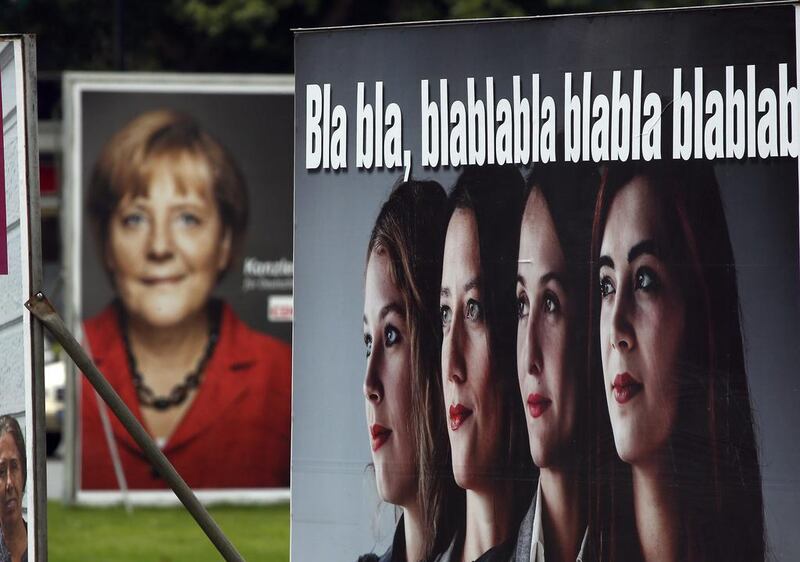BERLIN // Angela Merkel is widely expected to win tomorrow’s general elections, reinforcing her status as Europe’s de facto leader.
But a third term as German chancellor for Mrs Merkel is likely to dash international hopes that she will use her power to enhance Germany’s role in global diplomacy.
Opinion polls show her conservatives will emerge as the biggest political force by far. The only real question is whether she will have to switch coalition partners.
The ever-calm, no-nonsense Mrs Merkel, 59, dubbed “Mutti” or “Mummy” here, remains overwhelmingly popular and there is no mood for a change in government.
Germans credit her with having steered them through the euro crisis without costing taxpayers too much. She has also presided over healthy economic growth, largely thanks to global appetite for German cars and machinery.
Germany is an island of prosperity in a crisis-ravaged Europe, with unemployment of 6.8 per cent compared with 12.1 per cent in the 17-nation euro zone. But while Germany under Mrs Merkel has, albeit reluctantly, led efforts to combat the debt crisis, it continues to shun other roles on the world stage, citing its past militarism as a reason for taking a back seat.
“Not much will change in that respect. It’s the big German deficit,” Ulrike Guérot, an analyst at the European Council on Foreign Relations, a European think tank, said.
“We were told 50 years ago to stay away from strategy and military affairs. We have grown accustomed to this role, it’s part of our political culture and tradition. I don’t see what part of our political spectrum would drive any change in this respect.”
Berlin has stood on the sidelines of diplomatic manoeuvring following the chemical weapons attack in Syria, making clear from the outset that it would not be joining any military intervention. Mrs Merkel looked isolated at the G20 summit this month when she was the only European leader not to immediately sign a US-drafted statement calling for a strong international response to the attack. It took her a day to follow suit.
Germany also stayed out of the military operation to assist Libyan rebels in 2011, abstaining in a UN Security Council vote on setting up a no-fly zone. The move put Germany in the same corner as Russia and China and raised doubts about its reliability as a partner to its western allies.
Under Mrs Merkel, Germany’s foreign role in global politics has been erratic, and it has diminished. Her predecessor, Gerhard Schröder, had pledged a more forceful role for Germany, committing troops to their first combat mission since the Second World War by joining the Nato mission to bomb Serbia in the Kosovo crisis in 1999, and committing more than 4,000 troops to Afghanistan in 2001.
At the time, there was even an attempt to form a new doctrine for German combat missions abroad – that military action was at times necessary to prevent a repeat of Auschwitz, and that Germany must play a part for that reason.
That is all in the past. Mrs Merkel has no such doctrine. She has let domestic political concerns dictate her international policy, because military action is a sure-fire vote loser in Germany.
Critics say Germany is too big to limit its role to that of a big Switzerland. It is high time, they say, that wealthy Germany, the world’s third-largest weapons exporter, stops hiding behind the guilt of its past and put itself in harm’s way when needed.
But caution has always been Mrs Merkel’s watchword. It is has served her well and she is unlikely to abandon it now.
“But to be fair, one also has to say, be careful what you wish for,” said Ms Guérot. “Do you really want Germany, in addition to its economic dominance, to be a heavily militarised nation that leads the way in countries like Libya and Mali? People don’t seriously want that.”
Germany’s European partners are hoping that Mrs Merkel will win – better the devil you know – but also that she will be forced into a so-called “grand coalition” with the centre-left, pro-European Social Democratic Party (SPD) and ditch her current partner, the small, more eurosceptical pro-business Free Democratic Party (FDP).
Opinion polls suggest there is a strong chance of that happening, or she may just manage to keep her current coalition with the FDP intact.
The SPD, policymakers across Europe hope, will push Mrs Merkel into putting a bigger focus on stimulating economic growth and curbing unemployment in Europe. A grand coalition would, by virtue of its overwhelming majority in parliament, also lessen the threat posed by back-bench rebellions against future European bailout measures.
“If she is re-elected it will further boost Merkel’s stature within the EU and give her the green light to take even more of a lead in the euro crisis,” said Joanna McKay, a political analyst at Nottingham Trent University in the United Kingdom. “A grand coalition could actually strengthen Germany’s leadership role at the European level, with less scope for domestic opposition.”
foreign.desk@thenational.ae





